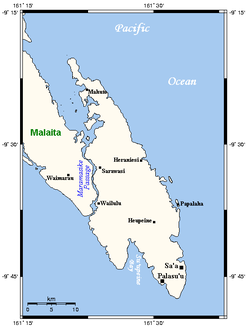
South Malaita Island
Encyclopedia

Malaita
Malaita is the largest island of the Malaita Province in the Solomon Islands. A tropical and mountainous island, Malaita's pristine river systems and tropical forests have not been exploited. Malaita is the most populous island of the Solomon Islands, with 140,000 people or more than a third of the...
in the eastern part of the Solomon Islands
Solomon Islands
Solomon Islands is a sovereign state in Oceania, east of Papua New Guinea, consisting of nearly one thousand islands. It covers a land mass of . The capital, Honiara, is located on the island of Guadalcanal...
. It is called "small" to distinguish it from the much larger mainland. It is now part of Malaita Province
Malaita Province
Malaita Province is one of the largest provinces of the Solomon Islands. It is named for its largest island, Malaita . Other islands include South Malaita Island , Sikaiana Island, and Ontong Java Atoll. The provincial capital and largest urban center is Auki, located on Big Malaita...
. During the colonial days, the island was divided by the colonial government and missionary establishments into the Asimeuri, Asimae, and Raroisu'u districts. Away from Malaita, most people from "Small" or "South" Malaita usually just say the word "South", everyone knows what they mean.
People on the island, however, preferred to identify only with members of their extended families, where ties are the strongest, and with members of their clan
Clan
A clan is a group of people united by actual or perceived kinship and descent. Even if lineage details are unknown, clan members may be organized around a founding member or apical ancestor. The kinship-based bonds may be symbolical, whereby the clan shares a "stipulated" common ancestor that is a...
s and tribe
Tribe
A tribe, viewed historically or developmentally, consists of a social group existing before the development of, or outside of, states.Many anthropologists use the term tribal society to refer to societies organized largely on the basis of kinship, especially corporate descent groups .Some theorists...
s, which are governed within traditionally demarcated regions known as iolas. The language spoken by the people of Small Malaita is the Sa'a
Sa'a
Sa'a can refer to:* Sa'a, Cameroon, a town in Cameroon* Sa'a language, of the Solomon Islands...
dialect. The language, however, has variations in pronunciation, grammar and vocabulary from iola to iola. The people practised patrilineal descent, with men having the most say over ownership rights and recognised as head of families, clans and tribes. Women played a much lesser role in the art of governing; however, they were equally respected in society.

